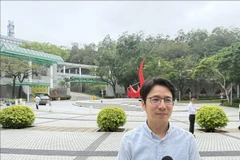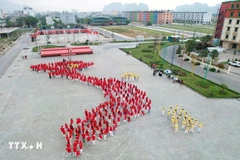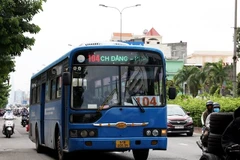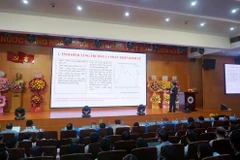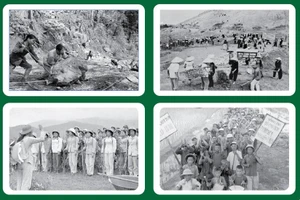Supporting in accordance with demand
In reality, vocational centres mostly teach what they have, therefore,vocations taught there do not meet recruitment demands, causing wastein training costs and not bringing effects.
Pham NgocPhuong, Director of the Can Tho provincial Department for Social EvilsPrevention, said that only three in 101 cases which received vocationaltraining and job assistance could seek jobs in businesses. The reason isthat what they were taught surpasses their ability, such as mechanicsand electrics. Besides, due to difficulties in life, they cannot takelong-term courses to improve their skills. As a result, after a periodof time, they cannot meet businesses’ demand. In addition, due to weakhealth, in particular of HIV-infected people, they cannot work inindustrial production lines or cope with job pressure.
Meanwhile, some people want to do jobs that can give them moneyimmediately, so they quit, seek short-term works and then becomeunemployed again. Thus, vocational training also needs to pay attentionto its aims when learners return to communities. Vocations which areoffered at centres also need to be plentiful and diversified to satisfysocial demands. At the same time, learners should be let to choose theirown vocations and forms of studying, staff at centres only give adviceand suggestions.
In particular, to prostitutes, onlythose who fall into difficult conditions and have no choice but tocommit prostitution want to receive support from the society. To thosewho consider this as a job to earn living, vocational training is notpractical.
Nguyen Van Tien, Vice Chairman of theNational Assembly’s Committee for Social Issues, said that it isnecessary to classify prostitutes to take appropriate measures. To thoseof the second type, it is better to re-educate them on lifestyle andperception first and then give advice on career orientation.
Accessing capital sources
According to the job creation policy, drug addicts and prostituteswill be provided at least 750,000 VND for self-employment to settletheir lives. Nonetheless, a number of opinions say that this support isstill low and unsustainable. Moreover, not all localities can affordthis money.
Do Manh Hung, Vice Chairman of theNational Assembly’s Committee for Social Issues, said many policies oncapital support and job creation for treated drug addicts andprostitutes have been issued, but most of them failed to be realised. Upuntil now, most of these people have only received assistance fromprojects funded by foreign organisations. This is a problem that needsto be promptly dealt with. Besides, authorities need to encouragebusinesses to recruit this group and credit organisations to lend moneyto treated addicts and prostitutes, not to discriminate against them.
Nguyen Thi Ngoc Anh, Deputy Director of HIV Prevention ResearchProject of the US Agency for International Development in Vietnam ,said that treated addicts and prostitutes have an urgent need forcapital to create jobs for themselves. However, most of them meetdifficulties in accessing capital sources and don’t know how to set upbusinesses due to lack of skills. Meanwhile, micro-finance institutionsdo not want to connect with them.
Basing on that fact,since the start of 2011, the project’s staff have approached andpersuaded charity funds in some provinces, including the TYM Fund of theVietnam Women’s Union, M7 – a financial organisation of Ho Chi MinhCity’s Labour Union, to lend capital to this group, Anh said.
They could borrow at a maximum from 7 million to 30 million VNDaccording to each vocation. In addition, they have also received medicaltreatment at health care centres and training to run businesses. As aresult, most borrowers have proved their capacity to pay debts, havesteady jobs and incomes.
On the part of micro-financeinstitutions, at first they were reluctant to contact potentialborrowers in this group. But after working with these people for sometime, the lenders have come to trust them and put them in the list ofmain customers. This is a model that needs to be spread to alllocalities. The important point is that whether localities are able toconnect financial organisations with the group of rehabilitated drugaddicts and prostitutes or not, she added.-VNA

